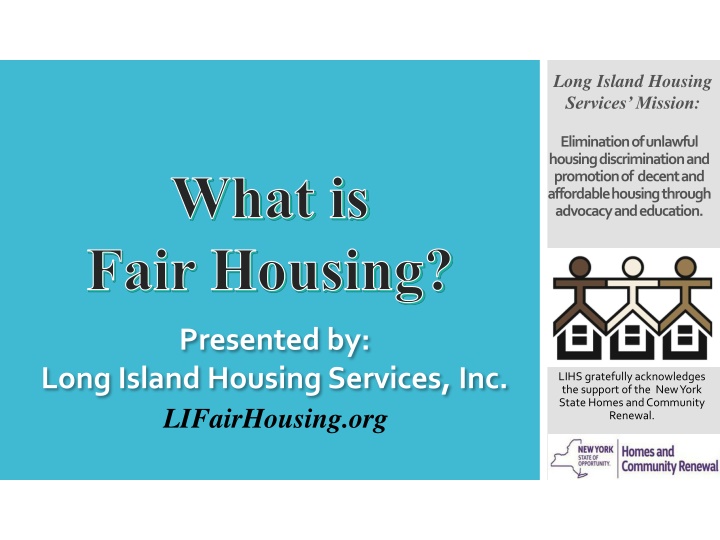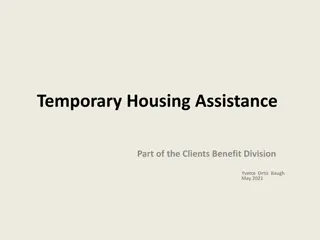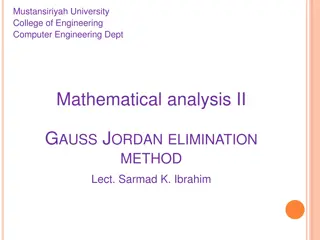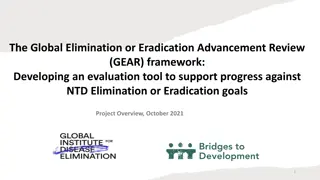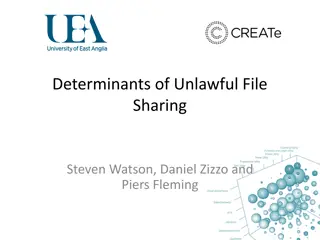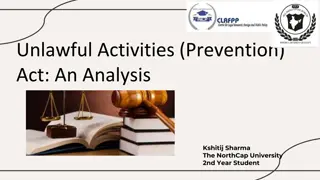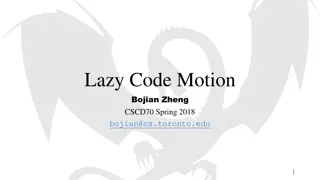Long Island Housing Services Mission: Elimination of Unlawful Housing Discrimination
Fair housing ensures equal access to housing opportunities without discrimination based on protected categories. New York State Fair Housing laws protect individuals from discrimination based on race, color, national origin, sex, disability, and other factors. Federal Fair Housing law also prohibits discrimination based on race, color, national origin, religion, disability, familial status, sex, sexual orientation, and gender identity.
Download Presentation

Please find below an Image/Link to download the presentation.
The content on the website is provided AS IS for your information and personal use only. It may not be sold, licensed, or shared on other websites without obtaining consent from the author.If you encounter any issues during the download, it is possible that the publisher has removed the file from their server.
You are allowed to download the files provided on this website for personal or commercial use, subject to the condition that they are used lawfully. All files are the property of their respective owners.
The content on the website is provided AS IS for your information and personal use only. It may not be sold, licensed, or shared on other websites without obtaining consent from the author.
E N D
Presentation Transcript
Long Island Housing Services Mission: Elimination of unlawful housing discrimination and promotion of decent and affordable housing through advocacy and education. What is Fair Housing? Presented by: Long Island Housing Services, Inc. LIFairHousing.org LIHS gratefully acknowledges the support of the New York State Homes and Community Renewal.
What is Fair Housing? Fair housing means that all people have the right to live in the housing of their choice that they can afford free from discrimination.* It is N.Y.S. and U.S. policy and law to promote equitable housing choice and eliminate segregation. *Discrimination: Denial of equal treatment and opportunity
What is Fair Housing? Fair housing laws ensure equal access and mandate that people have equal housing opportunities and not be subjected to discrimination based upon legally protected categories.
Whois protected under the Fair Housing laws ?
New York State FAIR HOUSING laws exist on 3 levels: U. S. Government County
In NEW YORKstate, it is also against the law to discriminate in housing because of a person s: Race Color National Origin Sex Disability Familial Status Marital status Sexual orientation Gender Identity Gender Expression Military Status Age (over 18) Creed Arrest** Source of Income* Citizenship and immigration status Domestic Violence Victim *Source of income includes public assistance, Section 8, SSD, SSI, and court-ordered child support. ** Arrest includes favorably resolved arrest, an adjournment in contemplation of dismissal (ACOD), and a sealed conviction record, or a youthful offender adjudication. In addition to Federal protections on the basis of Race, Color, National Origin, Religion, Sex, Disability, and Familial Status.
It is against Federal (U.S. Government) Fair Housing Law to discriminate in housing because of a person s: Race Color National Origin Religion Disability Familial Status Sex including Sexual Orientation and Gender Identity
Sexual Harassment under the Fair Housing Act Discrimination based on sex includes a protection against sexual harassment: Deliberate or repeated unwelcome comments Gestures or physical contact that create a hostile environment Example: Asking for sexual favors in exchange for an apartment, in lieu of rent, offers of reduced rent or extra amenities, etc.
Sex Discrimination and Domestic Violence Victims Domestic Violence Victims are protected because majority are women: Evicted because of domestic violence victim status nuisance or crime-free ordinances Example: LL does not want to deal with possible property damage by abuser; LL does not want police involved
In SUFFOLKCounty, it is also against the law to discriminate in housing because of a person s: Veteran Status Group Identity* *Group Identity includes actual or perceived: Age (over 18) Alienage or Citizenship Status Gender Sexual Orientation Military Status In addition to Federal (Race, Color, National Origin, Religion, Sex, Disability, and Familial Status )and New York State (Marital Status, Sexual Orientation, Gender Identity, Gender Expression, Age (over 18), Military Status, Creed) protections. Nassau County has the same protections covered under Federal and State laws.
In NASSAUCounty, it is also against the law to discriminate in housing because of a person s: Ethnicity Veteran Status First Responder Status In addition to Federal (Race, Color, National Origin, Religion, Sex, Disability, and Familial Status )and New York State (Marital Status, Sexual Orientation, Gender Identity, Gender Expression, Age (over 18), Military Status, Creed) protections.
Familial Status Protections Familial Status includes: Someone with 1 or more children under the age of 18 A pregnant woman Foster parents and adoptive parents Someone who has custody or guardianship of a child .
Familial Status Protections The Fair Housing Act makes it illegal to: Require an additional security deposit Segregate families with children (e.g. only downstairs units) Limit or restrict the use of the housing complex s pool, elevators, common areas, etc. Evict a family after a baby is born or adopted .
Who is Disabled? Disability means a person who has a physical or mental impairment that substantially limits one or more major life activities. One can have either a history of the impairment or can be viewed by others as having an impairment.
Major Life Activities include: Walking Seeing Hearing Speaking Breathing Learning Working Caring for your daily needs Disability
Providing Documentation of a Disability Generally, a landlord may NOT ask: Do you have a disability? How severe is your disability? May I have permission to see your medical records? Do you take medications? Why do you receive SSI? Disability
Providing Documentation of a Disability If your disability is obvious to others, you should NOT be required to provide documentation. Otherwise you can: Disability Show a copy of your current handicapped parking tag Provide a statement from a doctor, therapist, case manager, peer support group, etc. You should not need to provide copies of your medical records
Refusal to make reasonable accommodations Prohibited practices in rules, policies, practices, or services when such accommodations may be necessary for persons with a disability to have equal opportunity, full use and enjoyment of a dwelling Example: Because of a vision impairment, a tenant requests permission to have a guide dog with her in her apartment. The housing provider has a no-pets policy. This is a request for a reasonable accommodation, and the housing provider must grant the accommodation.
Refusing to allow for reasonable modifications Prohibited practices to properties when such modifications to structures are required by a person with a disability to allow them full use and access to a rental unit or common area, at the expense of the person with a disability Example: Because of a mobility disability, a tenant wants to install grab bars in the bathroom. This is a reasonable modification and must be permitted at the tenant s expense. *Note- In 2010, New York State Human Rights Law was modified to recognize that modifications are accommodations. It also placed the expense on providers for modifications to common and public use space
Source of Income Discrimination The New York State Human Rights Law protects persons against housing discrimination based on the source of income of the housing applicant. A party may not be denied housing based upon a alternative lawful source of income. ALL housing providers must accept or include income that is derived from legal sources outside of employment.
Disability and Source of Income Discrimination HOPWA (Housing Opportunities for Persons with AIDS) Nursing Home Transition and Diversion (NHTD) Medicaid Waiver program Traumatic Brain Injury (TBI) Medicaid Waiver program *Denial of any disability related housing voucher may be discrimination based on SOI and Disability Complaint can be filed with HUD under the FHA
Example of Lawful Source of Income OLMSTEAD housing subsidy (OHS), Rapid Transition Housing Program (RTHP), VASH (Veterans Affairs Supportive Housing) Unemployment benefits Child support Alimony or spousal maintenance Foster care subsidies Social security benefits (SSI, SSDI) Federal, state, or local public assistance Section 8 housing vouchers DSS One shot deal
Who must accept Lawful Source of Income? Owners, landlords Managing agents and management companies Co-op boards and condominium associations Tenants seeking to sublet Real estate brokers and salespersons Any employee or agent of the above
Example of SOI Discrimination Refusal to rent, including a housing provider offering fewer housing options Delaying review of applications Not responding at all to applicants with lawful sources of income Any other practices that create a barrier to housing for subsidized tenants
Example of SOI Discrimination No programs accepted Quota Rent to income ratio Bad credit No third party payments No DSS rental assistance such as one shot deal No third party contracts
What types of housing discrimination are prohibited?
Retaliation Prohibited Practices Coercion, intimidation, threats and interference Against persons who have exercised their Fair Housing rights Against persons who have acted as a witness or aided others to exercise their Fair Housing rights
Examples: Unlawful advertising discrimination: verbal, printed, or graphic Prohibited practices no children mature persons no criminal record Christians Only English Speakers Only no arrest record Ideal for a couple Must have employment income No Section 8 No Programs Logos that represent a particular race or religion, e.g. pictures featuring only White tenants.
Examples: Discriminatory Statements: I don t think it s safe for you to live here because of your disability. I will lower your rent this month if you have dinner with me. I am not approved to rent to section 8 tenants. I don t want domestic violence victims because police will be called often. I don t want anyone with criminal record. I won t rent a one-bedroom apartment to parent and child. I don t rent to African Americans, Hispanics, Jews etc. My apartment complex has a crime free policy and I don t want anyone with arrest records. I don t want foreigners living in my complex. It s not safe for young children because there are stairs. No Programs accepted. .
Protecting Your Fair Housing Rights *This chart is for administrative complaints, not judicial complaints filed in Federal District Court or NYS Supreme Court. Statute of Limitations: Administrative Complaint= 1 year and Federal Court = 2 years
Criminal Background and Fair Housing Discrimination
Criminal Background and Fair Housing Discrimination Disparities in U.S. Criminal Justice System lead to discrimination in housing. Estimated 45% of all people in New York State have an arrest or conviction record. 1 in 3 African American men have a felony conviction, compared to 1 in 12 total Americans.
Criminal Background and Fair Housing Discrimination African Americans are 13% of population, but 27% of arrests. African American males are incarcerated 5.7X compared to White males. African American females are incarcerated 1.7X compared to White females. Hispanics are incarcerated 1.3x compared to Whites.
Examples of Fair Housing Violations and Criminal Background Using tenant screening companies that provide background check reports that may be inaccurate, incomplete, incorrect or have no relationship to whether someone will be a good tenant. Denying housing based on favorably resolved arrest records. Blanket bans on anyone with a criminal record.
Examples of Fair Housing Violations and Criminal Background A housing provider that denies housing to an applicant who was granted an adjournment in contemplation of dismissal (ACOD). Treating applicants with similar criminal histories differently from one another based upon their race, national origin, disability or other protected characteristic.
Examples of Fair Housing Violations and Criminal Background A housing provider evicting a African American tenant who was convicted of a crime but does not evict a White tenant who was convicted of a similar crime. A housing provider evicting a tenant with a youthful offender adjudication.
Examples of Fair Housing Violations and Criminal Background Evicting individuals based on criminal activity that has no bearing on their tenancy, evicting entire families because of criminal conviction of one family member or crime victim status of one person.
Examples of Fair Housing Violations and Criminal Background A housing provider that will not rent to a tenant because of a sealed conviction record. A housing provider that automatically denies any applications where the potential renter has checked the box on the rental application inquiring if they have ever been convicted of a felony.
Recommendations for Housing Providers regarding Criminal Background Checks Housing providers should consider not using criminal history to screen tenants for housing. Criminal history is not a good predictor of housing success. Most housing providers are not required by law to exclude persons with criminal histories as tenants.
Recommendations for Housing Providers regarding Criminal Background Checks Housing providers can use other screening criteria, such as ability to pay rent, prior rental history, or personal references and landlord references to predict whether an applicant or resident would be a good tenant. Housing providers should evict for criminal activity only as a last resort (which includes conducting an individualized assessment to determine if the eviction is necessary).
Criminal Background and Fair Housing Lawsuits The Fortune Society, a non-profit organization in NYC, that provided temporary and permanent housing to hundreds of formerly incarcerated individuals each year, filed a lawsuit in 2014. The complaint alleged that Sandcastle Towers Housing Development refused to rent apartments to them for their clients in 2013 and 2014 because of their policy of prohibiting anyone with a criminal record from living there.
Criminal Background and Fair Housing Lawsuits Fortune alleged that the policy is discriminatory because it disproportionately bars African Americans and Hispanics from housing without considering each potential tenant s individual history and circumstances. The case was settled in October 2019 with Sandcastle s owners agreeing to pay $1,187,500. It is one of the largest settlements in a case challenging a ban on renting to people with criminal records.
How to Document and Report Housing Discrimination in a Timely Manner
How to Talk to Housing Providers Identify yourself Ask for names of anyone you speak with during the site visit or call Ask about the housing that you saw in advertisement/website Ask about availability
How to Talk to Housing Providers If housing is available, tell the housing provider about your living situation, such as number of minor children, disability, etc. DO NOT use acronyms If your housing voucher is for domestic violence victims or disability, please mention it.
How to Talk to Housing Providers If denied housing, DO NOT say that they are being discriminating or threaten to sue, and DO NOT mention LIHS After denial of housing, ask if you can make an appointment to see the rental property
How to Talk to Housing Providers On Behalf of Clients Identify yourself Ask for the names of any housing provider employees that you have contact with Ask about the housing that you saw in advertisement/website Ask about availability
How to Talk to Housing Providers On Behalf of Clients If available, tell the housing provider about your organization s mission Provide details about your client s situation (ie. disability, domestic violence, etc.) Provide specific details about the housing provider Do not use acronyms
How to Talk to Housing Providers On Behalf of Clients If the housing voucher is for domestic violence or disability, please mention it If denied housing, DO NOT say that they are being discriminating or threaten to sue, and DO NOT mention LIHS .
How to Document Interactions with Housing Providers Write the narrative as soon as possible, preferably on the same day of discrimination Write down the dates, time, names of housing provider Write down the name and address of property Make copies of all documents that you submit to the housing provider
